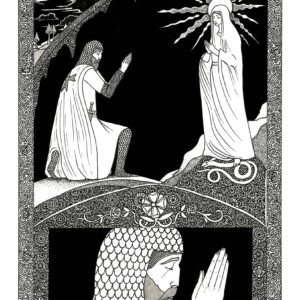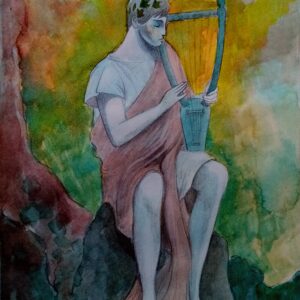Description
James Joyce
Automatic portrait
drawing.
Mixed media on Fabriano paper.
A4. 8.3 X 11.7 inches
Includes custom frame upon purchase.
The influence of alchemy on Irish writer James Joyce is a subject that has been explored extensively by scholars and academics. Joyce, who is considered one of the most important and influential writers of the 20th century, was deeply fascinated by the mystical and esoteric nature of alchemy. Alchemy is a philosophical and protoscientific tradition that dates back to ancient times, and it seeks to transform base metals into gold, achieve immortality, and discover the philosopher’s stone. The influence of alchemy on Joyce is evident in his works, particularly in his magnum opus, “Ulysses”, where the themes of transformation, transmutation, and spiritual renewal are central to the narrative.
One of the most prominent ways in which alchemy influenced Joyce’s writing is through the use of symbolism. Alchemy is rich in symbolism, with various elements such as metals, colors, and animals representing different aspects of the alchemical process. In “Ulysses”, Joyce employs similar symbolic language to convey deeper meanings and themes. For example, the character of Leopold Bloom can be seen as a representation of the alchemical process of transformation, as he undergoes a series of trials and tribulations throughout the novel that ultimately lead to spiritual renewal and enlightenment.
Furthermore, the concept of the philosopher’s stone, which is central to alchemy, can be seen as a recurring motif in Joyce’s work. The philosopher’s stone is believed to have the power to transmute base metals into gold and grant immortality to those who possess it. In “Ulysses”, the quest for the philosopher’s stone can be interpreted as a metaphor for the search for meaning and enlightenment in a chaotic and uncertain world. Joyce’s characters are constantly striving for a higher state of consciousness and self-realization, much like the alchemists who sought to unlock the secrets of the universe through their experiments and studies.
In addition to symbolism and motifs, the language and style of Joyce’s writing also bear the influence of alchemy. Alchemy is known for its cryptic and arcane terminology, as well as its focus on hidden meanings and esoteric knowledge. Joyce’s use of complex wordplay, allusions, and obscure references can be likened to the language of alchemy, which often requires a deep understanding of symbolic language and allegory to decipher its meaning. This is evident in Joyce’s masterful manipulation of language in “Ulysses”, where he employs a variety of literary techniques and devices to create a multi-layered and nuanced narrative that rewards careful analysis and interpretation.
Moreover, Joyce’s interest in alchemy can be traced back to his Irish heritage and cultural background. Ireland has a rich history of myths, legends, and folklore, many of which are infused with themes of transformation, transmutation, and spiritual renewal. Alchemy, with its emphasis on the transformation of the soul and the quest for higher knowledge, resonated deeply with Joyce’s own spiritual and artistic sensibilities. By drawing on the mystical and esoteric traditions of his homeland, Joyce was able to imbue his writing with a sense of depth and complexity that set him apart from his contemporaries.
Furthermore, Joyce’s fascination with alchemy can be seen as a reflection of his own personal struggles and inner turmoil. Like the alchemists who sought to transmute base metals into gold, Joyce was constantly striving to transform his own experiences, emotions, and thoughts into works of art that would stand the test of time. His preoccupation with the themes of transformation and renewal in his writing can be seen as a reflection of his own quest for self-discovery and self-expression. By exploring the mysteries of alchemy in his work, Joyce was able to delve deep into the human psyche and uncover hidden truths about the nature of existence and consciousness.
Additionally, Joyce’s interest in alchemy can be viewed as a response to the rapid societal and cultural changes that were taking place during his lifetime. The early 20th century was a time of great upheaval and transformation, with the rise of industrialization, urbanization, and modernity reshaping the world in profound ways. In the face of these sweeping changes, Joyce turned to the esoteric and mystical traditions of alchemy as a means of navigating the complexities of the modern world and finding meaning in a seemingly chaotic and fragmented reality. By embracing the teachings of alchemy, Joyce was able to tap into a deeper understanding of the interconnectedness of all things and the transcendent







